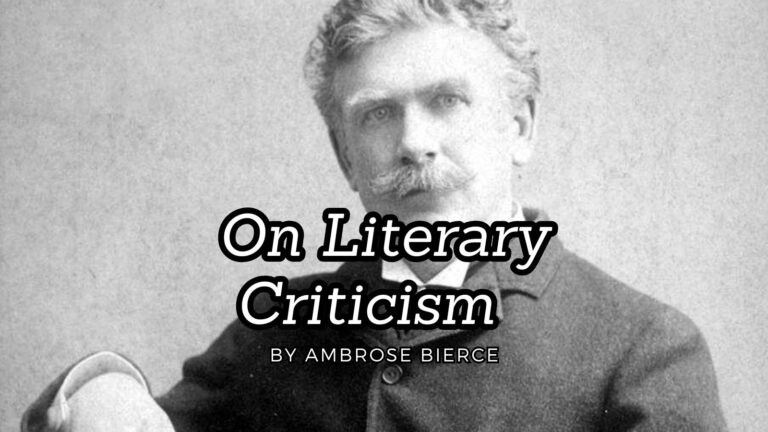Nothing so foolish as the laugh of fools.

Among all kinds of writing, there is none in which authors are more apt to miscarry than in works of humour, as there is none in which they are more ambitious to excel. It is not an imagination that teems with monsters, a head that is filled with extravagant conceptions, which is capable of furnishing the world with diversions of this nature; and yet, if we look into the productions of several writers, who set up for men of humour, what wild, irregular fancies, what unnatural distortions of thought do we meet with? If they speak nonsense, they believe they are talking humour; and when they have drawn together a scheme of absurd, inconsistent ideas, they are not able to read it over to themselves without laughing. These poor gentlemen endeavour to gain themselves the reputation of wits and humorists, by such monstrous conceits as almost qualify them for Bedlam; not considering that humour should always lie under the check of reason, and that it requires the direction of the nicest judgment, by so much the more as it indulges itself in the most boundless freedoms. There is a kind of nature that is to be observed in this sort of compositions, as well as in all other; and a certain regularity of thought which must discover the writer to be a man of sense, at the same time that he appears altogether given up to caprice. For my part, when I read the delirious mirth of an unskilful author, I cannot be so barbarous as to divert myself with it, but am rather apt to pity the man, than to laugh at anything he writes.
The deceased Mr. Shadwell, who had himself a great deal of the talent which I am treating of, represents an empty rake, in one of his plays, as very much surprised to hear one say that breaking of windows was not humour; and I question not but several English readers will be as much startled to hear me affirm, that many of those raving, incoherent pieces, which are often spread among us, under odd chimerical titles, are rather the offsprings of a distempered brain than works of humour.
It is, indeed, much easier to describe what is not humour than what is; and very difficult to define it otherwise than as Cowley has done wit, by negatives. Were I to give my own notions of it, I would deliver them after Plato’s manner, in a kind of allegory, and, by supposing Humour to be a person, deduce to him all his qualifications, according to the following genealogy. Truth was the founder of the family, and the father of Good Sense. Good Sense was the father of Wit, who married a lady of a collateral line called Mirth, by whom he had issue Humour. Humour therefore being the youngest of this illustrious family, and descended from parents of such different dispositions, is very various and unequal in his temper; sometimes you see him putting on grave looks and a solemn habit, sometimes airy in his behaviour and fantastic in his dress; insomuch that at different times he appears as serious as a judge, and as jocular as a merry-andrew. But, as he has a great deal of the mother in his constitution, whatever mood he is in, he never fails to make his company laugh.
But since there is an impostor abroad, who takes upon him the name of this young gentleman, and would willingly pass for him in the world; to the end that well-meaning persons may not be imposed upon by cheats, I would desire my readers, when they meet with this pretender, to look into his parentage, and to examine him strictly, whether or no he be remotely allied to Truth, and lineally descended from Good Sense; if not, they may conclude him a counterfeit. They may likewise distinguish him by a loud and excessive laughter, in which he seldom gets his company to join with him. For as True Humour generally looks serious while everybody laughs about him, False Humour is always laughing whilst everybody about him looks serious. I shall only add, if he has not in him a mixture of both parents—that is, if he would pass for the offspring of Wit without Mirth, or Mirth without Wit, you may conclude him to be altogether spurious and a cheat.
The impostor of whom I am speaking descends originally from Falsehood, who was the mother of Nonsense, who was brought to bed of a son called Phrensy, who married one of the daughters of Folly, commonly known by the name of Laughter, on whom he begot that monstrous infant of which I have been here speaking. I shall set down at length the genealogical table of False Humour, and, at the same time, place under it the genealogy of True Humour, that the reader may at one view behold their different pedigrees and relations:—
Falsehood.
Nonsense.
Phrensy.—Laughter.
False Humour.
Truth.
Good Sense.
Wit.—Mirth,
Humour.
I might extend the allegory, by mentioning several of the children of False Humour, who are more in number than the sands of the sea, and might in particular enumerate the many sons and daughters which he has begot in this island. But as this would be a very invidious task, I shall only observe in general that False Humour differs from the True as a monkey does from a man.
First of all, he is exceedingly given to little apish tricks and buffooneries.
Secondly, he so much delights in mimicry, that it is all one to him whether he exposes by it vice and folly, luxury and avarice; or, on the contrary, virtue and wisdom, pain and poverty.
Thirdly, he is wonderfully unlucky, insomuch that he will bite the hand that feeds him, and endeavour to ridicule both friends and foes indifferently. For, having but small talents, he must be merry where he can, not where he should.
Fourthly, Being entirely void of reason, he pursues no point either of morality or instruction, but is ludicrous only for the sake of being so.
Fifthly, Being incapable of anything but mock representations, his ridicule is always personal, and aimed at the vicious man, or the writer; not at the vice, or at the writing.
I have here only pointed at the whole species of false humorists; but, as one of my principal designs in this paper is to beat down that malignant spirit which discovers itself in the writings of the present age, I shall not scruple, for the future, to single out any of the small wits that infest the world with such compositions as are ill-natured, immoral, and absurd. This is the only exception which I shall make to the general rule I have prescribed myself, of attacking multitudes; since every honest man ought to look upon himself as in a natural state of war with the libeller and lampooner, and to annoy them wherever they fall in his way. This is but retaliating upon them, and treating them as they treat others.
SA GA YEAN QUA RASH TOW’S IMPRESSIONS OF LONDON.
Nunquam aliud natura, aliud sapientia dicit.
Juv., Sat. xiv. 321.
Good taste and nature always speak the same.
When the four Indian kings were in this country about a twelvemonth ago, I often mixed with the rabble, and followed them a whole day together, being wonderfully struck with the sight of everything that is new or uncommon. I have, since their departure, employed a friend to make many inquiries of their landlord the upholsterer relating to their manners and conversation, as also concerning the remarks which they made in this country; for next to the forming a right notion of such strangers, I should be desirous of learning what ideas they have conceived of us.
The upholsterer finding my friend very inquisitive about these his lodgers, brought him sometime since a little bundle of papers, which he assured him were written by King Sa Ga Yean Qua Rash Tow, and, as he supposes, left behind by some mistake. These papers are now translated, and contain abundance of very odd observations, which I find this little fraternity of kings made during their stay in the Isle of Great Britain. I shall present my reader with a short specimen of them in this paper, and may perhaps communicate more to him hereafter. In the article of London are the following words, which without doubt are meant of the church of St. Paul:—
“On the most rising part of the town there stands a huge house, big enough to contain the whole nation of which I am the king. Our good brother E Tow O Koam, King of the Rivers, is of opinion it was made by the hands of that great God to whom it is consecrated. The Kings of Granajar and of the Six Nations believe that it was created with the earth, and produced on the same day with the sun and moon. But for my own part, by the best information that I could get of this matter, I am apt to think that this prodigious pile was fashioned into the shape it now bears by several tools and instruments, of which they have a wonderful variety in this country. It was probably at first a huge misshapen rock that grew upon the top of the hill, which the natives of the country, after having cut into a kind of regular figure, bored and hollowed with incredible pains and industry, till they had wrought in it all those beautiful vaults and caverns into which it is divided at this day. As soon as this rock was thus curiously scooped to their liking, a prodigious number of hands must have been employed in chipping the outside of it, which is now as smooth as the surface of a pebble; and is in several places hewn out into pillars that stand like the trunks of so many trees bound about the top with garlands of leaves. It is probable that when this great work was begun, which must have been many hundred years ago, there was some religion among this people; for they give it the name of a temple, and have a tradition that it was designed for men to pay their devotion in. And indeed, there are several reasons which make us think that the natives of this country had formerly among them some sort of worship, for they set apart every seventh day as sacred; but upon my going into one of these holy houses on that day, I could not observe any circumstance of devotion in their behaviour. There was, indeed, a man in black, who was mounted above the rest, and seemed to utter some thing with a great deal of vehemence; but as for those underneath him, instead of paying their worship to the deity of the place, they were most of them bowing and curtsying to one another, and a considerable number of them fast asleep.
“The queen of the country appointed two men to attend us, that had enough of our language to make themselves understood in some few particulars. But we soon perceived these two were great enemies to one another, and did not always agree in the same story. We could make a shift to gather out of one of them that this island was very much infested with a monstrous kind of animals, in the shape of men, called Whigs; and he often told us that he hoped we should meet with none of them in our way, for that, if we did, they would be apt to knock us down for being kings.
“Our other interpreter used to talk very much of a kind of animal called a Tory, that was as great a monster as the Whig, and would treat us as ill for being foreigners. These two creatures, it seems, are born with a secret antipathy to one another, and engage when they meet as naturally as the elephant and the rhinoceros. But as we saw none of either of these species, we are apt to think that our guides deceived us with misrepresentations and fictions, and amused us with an account of such monsters as are not really in their country.
“These particulars we made a shift to pick out from the discourse of our interpreters, which we put together as well as we could, being able to understand but here and there a word of what they said, and afterwards making up the meaning of it among ourselves. The men of the country are very cunning and ingenious in handicraft works, but withal so very idle, that we often saw young, lusty, raw-boned fellows carried up and down the streets in little covered rooms by a couple of porters, who were hired for that service. Their dress is likewise very barbarous, for they almost strangle themselves about the neck, and bind their bodies with many ligatures, that we are apt to think are the occasion of several distempers among them, which our country is entirely free from. Instead of those beautiful feathers with which we adorn our heads, they often buy up a monstrous bush of hair, which covers their heads, and falls down in a large fleece below the middle of their backs, with which they walk up and down the streets, and are as proud of it as if it was of their own growth.
“We were invited to one of their public diversions, where we hoped to have seen the great men of their country running down a stag, or pitching a bar, that we might have discovered who were the persons of the greatest abilities among them; but instead of that, they conveyed us into a huge room lighted up with abundance of candles, where this lazy people sat still above three hours to see several feats of ingenuity performed by others, who it seems were paid for it.
“As for the women of the country, not being able to talk with them, we could only make our remarks upon them at a distance. They let the hair of their heads grow to a great length; but as the men make a great show with heads of hair that are none of their own, the women, who they say have very fine heads of hair, tie it up in a knot, and cover it from being seen. The women look like angels, and would be more beautiful than the sun, were it not for little black spots that are apt to break out in their faces, and sometimes rise in very odd figures. I have observed that those little blemishes wear off very soon; but when they disappear in one part of the face, they are very apt to break out in another, insomuch that I have seen a spot upon the forehead in the afternoon which was upon the chin in the morning.”
The author then proceeds to show the absurdity of breeches and petticoats, with many other curious observations, which I shall reserve for another occasion: I cannot, however, conclude this paper without taking notice that amidst these wild remarks there now and then appears something very reasonable. I cannot likewise forbear observing, that we are all guilty in some measure of the same narrow way of thinking which we meet with in this abstract of the Indian journal, when we fancy the customs, dresses, and manners of other countries are ridiculous and extravagant if they do not resemble those of our own.
- How to Edit your poetry for beginners and beyond (with worksheet) - April 18, 2025
- 20 Forgotten Gothic Stories Writers Need to Rediscover - April 18, 2025
- The Writer’s Roadmap: Embracing Outlining (Free Worksheet Included!) - April 15, 2025






